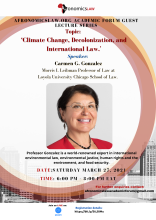Call for Application: Master's, Doctoral and Postdoctoral Research in International Law, University of Pretoria
May 18, 2021
The South African Research Chair in International Constitutional Law in the Faculty of Law (UP Law) at the University of Pretoria (UP), Prof Dire Tladi, invites applications for full-time Research Master's / Doctoral / Postdoctoral candidates commencing in 2022.
The relevant areas of research to which this call relates are:
(a) The law of International Organizations, including the United Nations and the African Union

